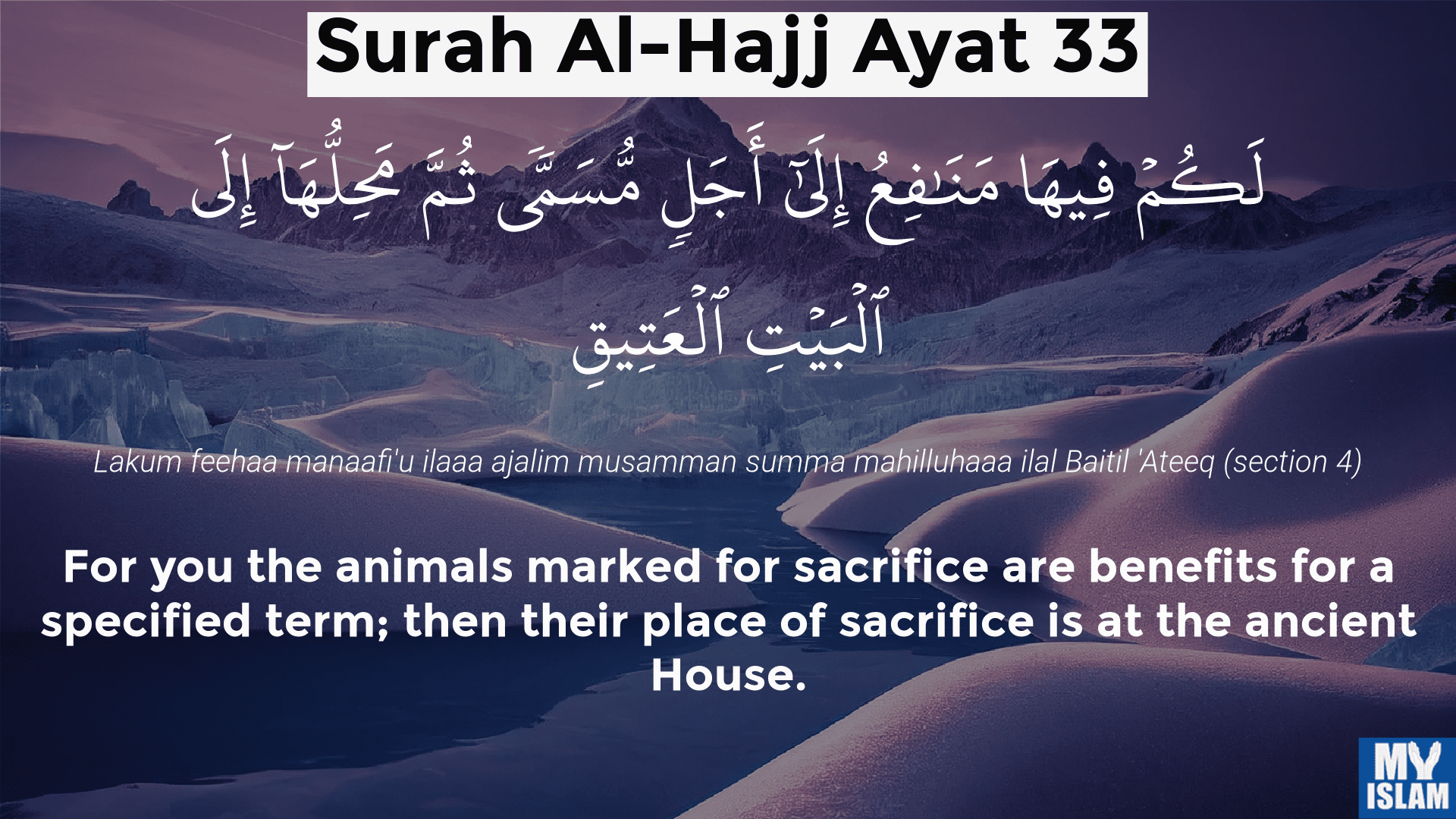Surah Hajj Ayat 33 in Arabic Text
English Translation
Here you can read various translations of verse 33
For you the animals marked for sacrifice are benefits for a specified term; then their place of sacrifice is at the ancient House.
In them ye have benefits for a term appointed: in the end their place of sacrifice is near the Ancient House.
You may derive benefit (from sacrificial animals) until an appointed time. Thereafter their place (of sacrifice) is near the Ancient House.
In them (cattle offered for sacrifice) are benefits for you for an appointed term, and afterwards they are brought for sacrifice unto the ancient House (the Haram – sacred territory of Makkah city).
Therein are benefits for you for an appointed term; and afterward they are brought for sacrifice unto the ancient House.
Therein are benefits for you to a stated term; thereafter their lawful destination (i.e., for sacrifice) is by the Ancient House.
Live-stock are useful to you until the set time. Then their place of sacrifice is near the Ancient House:
ان میں تمہارے لئے ایک مقرر وقت تک فائده ہے پھر ان کے حلال ہونے کی جگہ خانہ کعبہ ہے
Quran 22 Verse 33 Explanation
For those looking for commentary to help with the understanding of Surah Hajj ayat 33, we’ve provided two Tafseer works below. The first is the tafseer of Abul Ala Maududi, the second is of Ibn Kathir.
Ala-Maududi
(22:33) You may derive benefit (from sacrificial animals) until an appointed time.[62] Thereafter their place (of sacrifice) is near the Ancient House.[63]
62. This is to remove the misunderstanding about getting any benefit from the animals dedicated for sacrifice as they were also included in the symbols of Allah. This was necessitated because the Arabs believed that it was unlawful to get any benefit from them. One could neither ride on them nor carry any load on them nor consume their milk, after they had been dedicated for sacrifice during Hajj. In this verse that misunderstanding has been removed. Abu Hurairah and Anas have reported that the Prophet (peace be upon him) saw a man walking in a miserable condition on foot leading his camel by the nosestring. When the Prophet (peace be upon him) asked him to ride on it, he replied that it was his sacrificial offering. The Prophet (peace be upon him) again urged him to ride on his camel.
There is a divergence of opinion in regard to the interpretation “of an appointed term”. Some commentators, particularly Ibn Abbas, Qatadah, Mujahid, Dahhak and Ata are of the view that it refers to the time of the dedication of the animals for sacrifice. Obviously this is not the correct view, because in that case the permission to get benefit from them becomes meaningless. There are other commentators including Urwah bin Zubair and Ala bin Abi Rabah, who are of the view that “appointed term” means the time of sacrifice and one can get benefit from them up till then. One may ride on them, drink their milk, take their young ones for use and shear their hair, wool, etc. Imam Shafai has adopted this view. The Hanafites are of the opinion that one can get benefit from them, if need be, though it is preferable not to do so.
63. It does not mean that the sacrifice is to be made in the precincts of the Ancient House of the Kaah. The Quran uses the House of Allah or Masjid-i-Haram for the whole of the Inviolable Place of Makkah and not for that particular building. (Surah Al-Maidah, Ayat 95).
Ibn-Kathir
The tafsir of Surah Al-Hajj verse 33 by Ibn Kathir is unavailable here.
Please refer to Surah Hajj ayat 32 which provides the complete commentary from verse 32 through 33.
Quick navigation links






